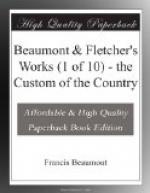So free this work is, Gentlemen, from offence,
That we are confident, it needs no defence
From us, or from the Poets—we dare look
On any man, that brings his Table-book
To write down, what again he may repeat
At some great Table, to deserve his meat.
Let such come swell’d with malice, to apply
What is mirth here, there for an injurie.
Nor Lord, nor Lady we have tax’d; nor State,
Nor any private person, their poor hate
Will be starved here, for envy shall not finde
One touch that may be wrested to her minde.
And yet despair not, Gentlemen, The play
Is quick and witty; so the Poets say,
And we believe them; the plot neat, and new,
Fashion’d like those, that are approv’d
by you.
Only ’twill crave attention, in the most;
Because one point unmarked, the whole is lost.
Hear first then, and judge after, and be free,
And as our cause is, let our censure be.
Epilogue.
Why there should be an Epilogue to a play,
I know no cause: the old and usuall way,
For which they were made, was to entreat the grace
Of such as were spectators in this place,
And time, ’tis to no purpose; for I know
What you resolve already to bestow,
Will not be alter’d, what so e’re I say,
In the behalf of us, and of the Play;
Only to quit our doubts, if you think fit,
You may, or cry it up, or silence it.
Another Prologue for the Custom of the Country.
We wish, if it were possible, you knew
What we would give for this nights look,
if new.
It being our ambition to delight
Our kind spectators with what’s
good, and right.
Yet so far know, and credit me, ’twas made
By such, as were held work-men in their
Trade,
At a time too, when they as I divine,
Were truly merrie, and drank lusty wine,
The nectar of the Muses; Some are here
I dare presume, to whom it did appear
A well-drawn piece, which gave a lawfull birth
To passionate Scenes mixt with no vulgar
mirth.
But unto such to whom ’tis known by fame
From others, perhaps only by the name,
I am a suitor, that they would prepare
Sound palats, and then judge their bill
of fare.
It were injustice to decry this now
For being like’d before, you may
allow
(Your candor safe) what’s taught in the old
schools,
All such as liv’d before you, were
not fools.
The Epilogue.
I spake much in the Prologue for the Play,
To its desert I hope, yet you might say
Should I change now from that, which then was meant,
Or in a syllable grow less confident,
I were weak-hearted. I am still the same
In my opinion, and forbear to frame
Qualification, or excuse: If you
Concur with me, and hold my judgement
true,
Shew it with any sign, and from this place,
Or send me off exploded, or with grace.




